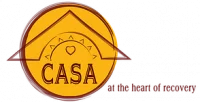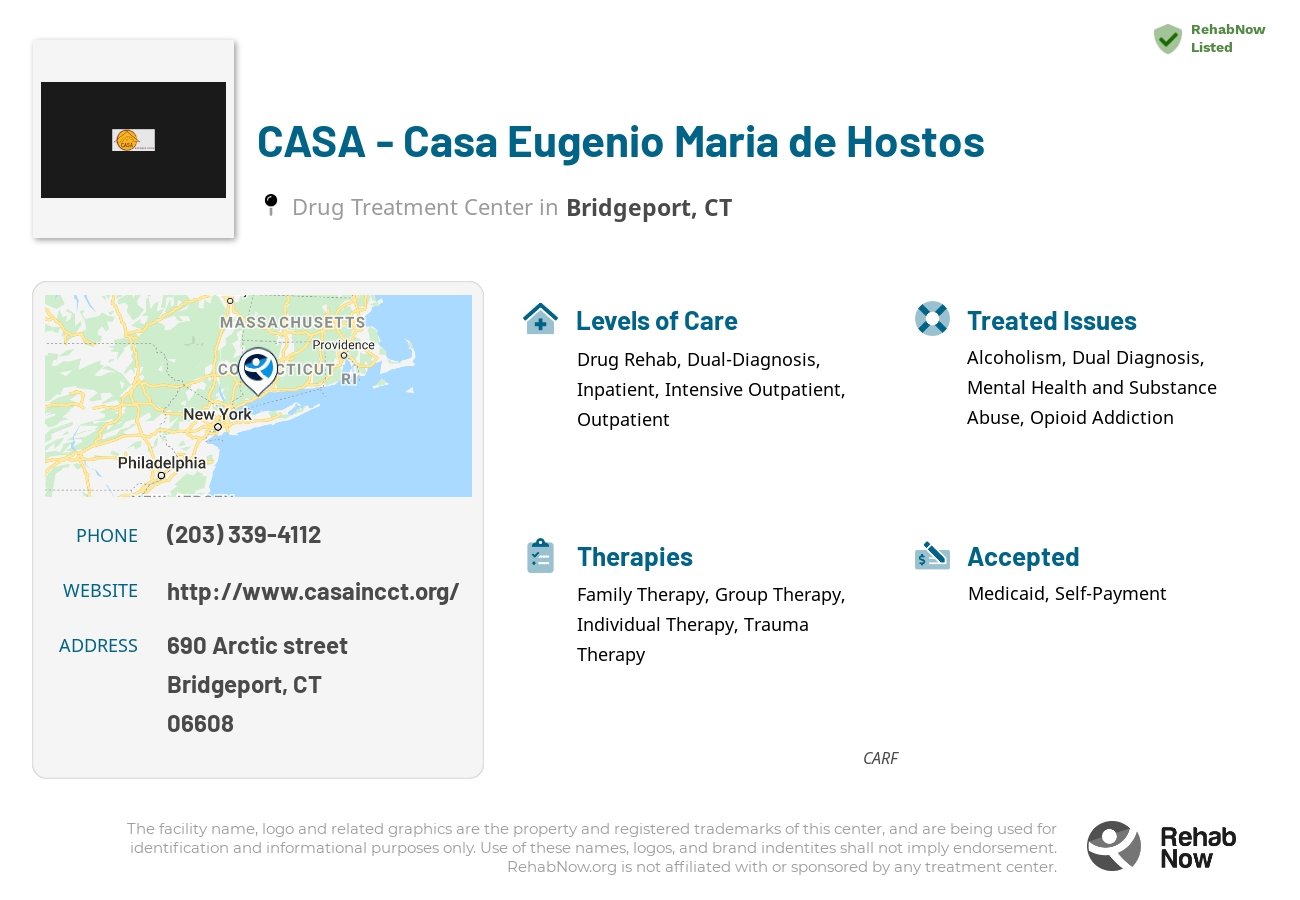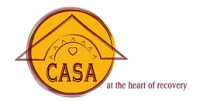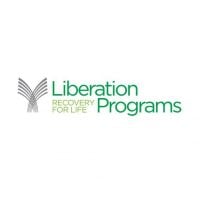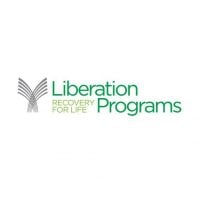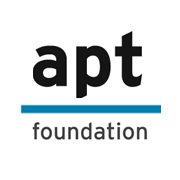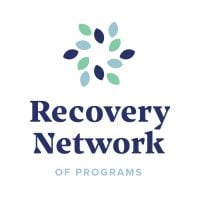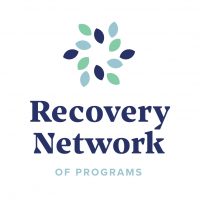CASA - Casa Eugenio Maria de Hostos
Drug Rehab Center in Bridgeport, Connecticut
CASA - Casa Eugenio Maria de Hostos in Bridgeport, Connecticut is a leading addiction treatment facility that offers personalized services and a variety of treatment options for individuals struggling with addiction, including drug rehab, dual-diagnosis, inpatient and outpatient programs, supported by specialized therapeutic programs and aftercare support services.
About CASA - Casa Eugenio Maria de Hostos in Connecticut
CASA - Casa Eugenio Maria de Hostos, situated in Bridgeport, Connecticut, offers both inpatient and outpatient treatments catering to individuals battling alcohol and substance addiction. This facility stands out for its comprehensive approach, integrating trauma therapy, individualized counseling, and group sessions into its recovery process.
CASA - Casa Eugenio Maria de Hostos has earned accreditations from the Commission on Accreditation of Rehabilitation Facilities (CARF) and the Substance Abuse and Mental Health Services Administration (SAMHSA). These credentials underscore their commitment to delivering high-quality care through evidence-based practices and recovery-oriented approaches.
- Person-Centered Approach: Tailors recovery plans to suit individual needs, addressing the root causes of addiction.
- Wide Range of Services: Offers a spectrum of services from detoxification to aftercare support, catering to various stages of recovery.
- Expertise in Various Therapies: Employs therapies like Cognitive Behavioral Therapy (CBT) and Dialectical Behavioral Therapy (DBT) to equip individuals with coping mechanisms.
CASA targets issues related to alcoholism, dual diagnosis, opioid addiction, drug addiction, and substance abuse. Their treatment methodology encompasses an array of options including inpatient, outpatient, partial hospitalization, and intensive outpatient programs, emphasizing holistic and culturally competent care.
Genders
Ages
Modality
Additional
Accreditations
SAMHSA

CARF
The Commission on Accreditation of Rehabilitation Facilities (CARF) is a non-profit organization that specifically accredits rehab organizations. Founded in 1966, CARF's, mission is to help service providers like rehab facilities maintain high standards of care.
Conditions and Issues Treated
With so many people addicted to opioids, we need to help those who want to quit. The cycle begins when opioid addicts take opioids for a painful injury. When someone starts taking their medication differently or in excess, it means they’re addicted and at risk of overdosing.
In , detoxing from these types of treatments is the most effective way to beat this. Most facilities begin with medical assistance and then provide counseling services; rehabilitation follows after successful treatment.
Dual diagnosis refers to someone who has both an addiction and a mental or emotional illness. Dual diagnosis treatment includes therapy for both issues simultaneously, allowing for effective treatment of either.
Sometimes people with addiction disorders also have co-occurring disorders like depression, anxiety, bipolar disorder, etc. These require specialized treatment programs that address both drug and alcohol addiction as well as psychiatric illnesses. Some rehabilitation facilities provide patients with co-occurring disorders a program with highly integrated services and a clean, distraction-free environment.
Levels of Care Offered
This center offers a variety of custom treatment tailored to individual recovery. Currently available are Drug Rehab, Dual-Diagnosis, Inpatient, Intensive Outpatient, Outpatient, with additional therapies available as listed below.
Inpatient treatment is a form of recovery used in drug rehab. Inpatient recovery offers individual therapy, groups, and family therapy to ensure that the addict has the best recovery possible. A variety of treatments are provided in this type of recovery, depending on what treatment the addict needs at that particular time.
The length of inpatient addiction treatment depends on the addict and their addiction. Inpatient rehabilitation can last anywhere from 30 days to 90 days, depending on how severe the drug abuse is. Inpatient rehab is a costly drug treatment, costing anywhere from $30k- to $60k. However, insurance often offers help in covering these costs.
An intensive outpatient program (IOP) is effective for drug rehab, but it can take six months to several years to complete. It’s the most popular type of drug rehab program in the United States. One example of a successful IOP success story is actor and comedian Chris Rock, sober since 1990.
An IOP allows participants to spend nights at home while attending meetings throughout the day. It’s a good way for drug addicts to make a recovery plan in an outpatient setting while still supporting their loved ones.
Alcohol or drug addiction, or co-occurring disorders, are treated in an outpatient program. The patient must attend therapy and other programs at the facility but can return home each night.
Outpatient treatment allows recovering addicts to live at home while receiving addiction treatment. Outpatients can attend group sessions for a few hours per week. Outpatients may also continue to work full time and study/attend school without interruption if they choose.
Therapies & Programs
Different people react differently to various treatment options. Some drug rehabilitation centers offer individualized treatment that caters to the specific needs of a drug addict. The best treatment option varies on an individual depending on the type of drug abused, life history, medical condition of the person, social circumstances, and the environment they live in now.
When a person enters drug rehab, they usually have anti-drug associations such as withdrawal symptoms, stress, cravings, etc. The first step of drug rehab is to detoxify the body from any residual substances in it. Drug rehabilitation centers usually employ trained medical professionals to help in this process. Usually, the initial detoxification lasts for five days, where the person is monitored under close supervision.
Family therapy sessions typically involve the addict and their family members. During these sessions, a therapist will work with everyone involved to help them understand addiction and find healthy ways of coping without substance abuse.
Some addicts might feel embarrassed about their substance abuse problems. By encouraging family members to attend these sessions, therapists can show addicts that they’re not alone in dealing with addiction. Therapists can also work with family members to help them understand addiction and learn how to offer support and encouragement to their loved one as they deal with substance abuse issues.
Attending group therapy at CASA - Casa Eugenio Maria de Hostos in , is a useful way for those seeking sobriety to realize they aren’t the only one going through it.
This is when a group of people on different recovery phases get together and talk about what they’re going through, their triggers, successes, and failures. This can include alternative types of therapies too! Group therapy may occur on an outpatient or inpatient basis with groups that have no pre-existing relationships outside the session, unlike support groups where everyone already knows each other beforehand.
Trauma therapy is a form of therapy used to help people process and understand past traumas. This can help struggling addicts, as many people turn to drugs or alcohol to mask the pain of their past. Trauma therapy can be done in several ways, such as through visualization, discussion, and writing down thoughts and feelings. The goal is to help the individual understand why they are having problems coping with certain situations and changing how they think and react to things. This is often done in tandem with other therapies to treat the underlying issues associated with addiction.
The idea behind trauma therapy is that while some people can experience traumatic events and not have lasting psychiatric symptoms, many others will. In these cases, memories get hidden from consciousness but continue to influence how the person processes and copes with things in their life. They may avoid situations that resemble what happened or become suddenly angry or irritated to a situation that reminds them of a past event. With the help of a therapist, people can go back over memories and experiences. This helps them understand why they are having problems coping with certain situations and changing how they think and react to things.
Payment Options Accepted
For specific insurance or payment methods please contact us.
CASA Associated Centers
Discover treatment facilities under the same provider.
Learn More About CASA Centers
Additional Details
Specifics, location, and helpful extra information.
Bridgeport, Connecticut 6608 Phone Number(203) 339-4112 Meta DetailsUpdated April 15, 2024
Staff Verified
CASA - Casa Eugenio Maria de Hostos Patient Reviews
There are no reviews yet. Be the first one to write one.
Bridgeport, Connecticut Addiction Information
Connecticut has a higher rate of substance abuse and addiction than the national average. The state ranks in the top 10 in the country for illicit drug dependence among those ages 18 to 25. In 2010, there were 9,211 people admitted to an alcohol treatment facility for alcohol abuse combined with a secondary drug. Connecticut ranked fifth in the United States of America for the number of fatalities involving drunk driving in 2014.
10% of Bridgeport residents reported using illicit drugs. There were 2,737 drug-related incidents in 2019. Of these incidents, 1,964 were for illegal drug use or possession and 773 were for drug paraphernalia. 28% of people who abuse drugs are also alcoholics. Drug and alcohol rehab centers in Bridgeport offer a variety of treatment options that can help people recover from addiction.
Treatment in Nearby Cities
- Litchfield, CT (38.6 mi.)
- Windsor, CT (53.6 mi.)
- Bridgeport, CT (0.9 mi.)
- Milford, CT (6.5 mi.)
- Chester, CT (39.0 mi.)
Centers near CASA - Casa Eugenio Maria de Hostos
The facility name, logo and brand are the property and registered trademarks of CASA - Casa Eugenio Maria de Hostos, and are being used for identification and informational purposes only. Use of these names, logos and brands shall not imply endorsement. RehabNow.org is not affiliated with or sponsored by CASA - Casa Eugenio Maria de Hostos.
